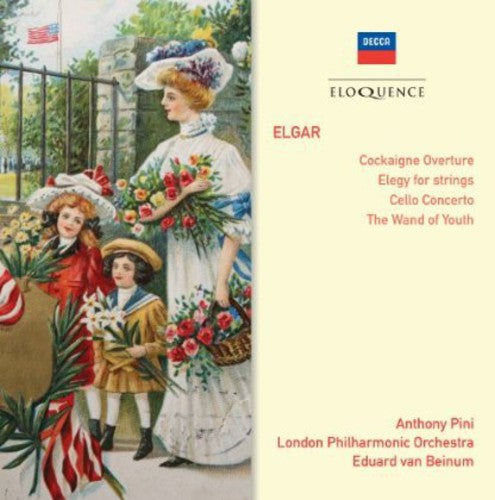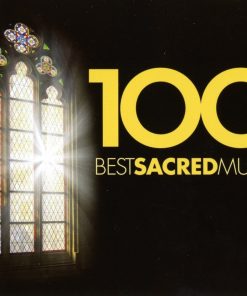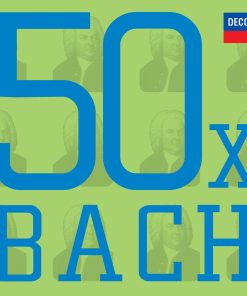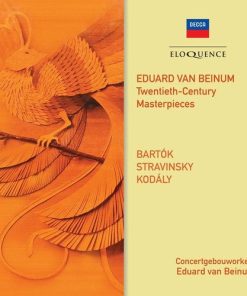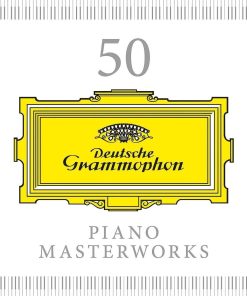ELGAR: CELLO CONCERTO, ELEGY FOR STRINGS, WAND OF YOUTH, COCKAIGNE OVERTURE – PINI, VAN BEINUM, LONDON PHILHARMONIC DECCA
$ 11,99 $ 7,19

Bringing together Eduard van Beinum’s complete Elgar recordings for Decca, this important historic reissue presents multi-faceted sides of the composer: his sense of national pride in Cockaigne, his fondness of childhood memories in The Wand of Youth, and his profundity in the little Elegy and his masterpiece, the Cello Concerto. The Wand of Youth actually originated as far back as 1870 when the Elgar children, at their home at Broadheath near Worcester, concocted a family playlet for which the youthful composer provided some music. He kept the music of this enchantingly innocent premise and, 37 years later, at a time when he was feeling his way into the very different world of his first symphony, looked over the sketches and decided to re-score them for full orchestra. The music was such a success when Henry Wood premièred the first suite in London in 1907 that Elgar straightaway produced a second which, conducted by him at the 1908 Three Choirs Festival at Worcester, happily took the music right back to its geographical source nearly 40 years before.
The tiny Elegy for Strings was written In Memoriam for an official of the Worshipful Musicians Company who had died. In 1901, Elgar’s embrace widened when he dedicated his new overture Cockaigne ‘To my many friends the members of British orchestras.’ ‘Honest, healthy, humorous, and strong but not vulgar’ was his own description of his musical portrait of London at the turn of that century, in which the pomp and high spirits of the capital are celebrated in music of a thoroughly patriotic and exuberant style. Although Elgar lived for another fifteen years, the Cello Concerto of 1919 was his last major work: the remaining years produced only occasional pieces such as the Nursery Suite and the fifth Pomp and Circumstance march and some planned projects that were never completed. He called the Concerto ‘a man’s attitude to life’ and its introverted mood stayed with him, particularly after the death of his wife the year after it appeared.
Elgar’s music was one of Eduard van Beinum’s enthusiasms, and it was fascinating in the post-war period in England to be able to hear a foreign maestro’s view of Cockaigne, the Cello Concerto and the suites of the Wand of Youth music, all recorded in London. The brilliant, sure-footed playing in the Elgar pieces heard on this disc testifies to the alert, warm-hearted response he was capable of obtaining as much from the LPO as from his Concertgebouw players. The friendliness towards musicians for which he became renowned and the absolute trust he placed in them endeared him to everybody, ultimately earning both respect and devotion.
All recordings are remastered from the original sources.

ELGAR
Cockaigne Overture, Op.40
Cello Concerto in E minor, Op.85
Elegy for strings, Op.58
The Wand of Youth: Suites
Anthony Pini, cello
London Philharmonic Orchestra
Eduard van Beinum

Cockaigne fairly swaggers with exuberance, the LPO responding with tremendous zest and fresh-faced application for its then chief, yet there’s tenderness, poetry and humour aplenty when required.’ (Cockaigne) Gramophone
‘Anthony Pini’s reading of the Cello Concerto has an unaffected quality that I like very much; its reticence matches Elgar’s own and […] it has the quiet sincerity that eludes those who consciously strive for it.” … [The Cello Concerto is] played with great command of its technical difficulties. I simply don’t know why, when we have a player like this [Anthony Pini] on our door-step, we don’t hear more of him. He may not have the big tone of his French rivals but it is a beautiful tone and he always plays with consummate skill and sympathy … The sheer poetry of the slow movement comes through’ Gramophone
‘Van Beinum extracts heaps of vigour, innocence, nostalgia and wit from these captivating miniatures [The Wand of Youth], and I’d place his poetic and strongly characterised accounts at the top of the pile alongside those of Handley (CfP) and Elgar (in EMI’s British Composers series).’ Gramophone
Fast Shipping and Professional Packing
Due to our longstanding partnership with UPS FedEx DHL and other leading international carriers, we are able to provide a range of shipping options. Our warehouse staff are highly trained to pack your goods exactly according to the specifications that we supply. Your goods will undergo a thorough examination and will be safely packaged prior to being sent out. Everyday we deliver hundreds of packages to our customers from all over the world. This is an indication of our dedication to being the largest online retailer worldwide. Warehouses and distribution centers can be located in Europe as well as the USA.
Orders with more than 1 item are assigned processing periods for each item.
Before shipment, all ordered products will be thoroughly inspected. Today, most orders will be shipped within 48 hours. The estimated delivery time is between 3-7 days.
Returns
The stock is constantly changing. It's not entirely managed by us since we are involved with multiple parties such as the factory and our storage. The actual stock can fluctuate at any time. Please understand it may happen that your order will be out of stock when the order is placed.
Our policy is valid for 30 days. If you haven't received your product within 30 days, we're not able to issue either a return or exchange.
You are able to return a product if it is unused and in the same condition when you received it. It must also still remain in the original packaging.
